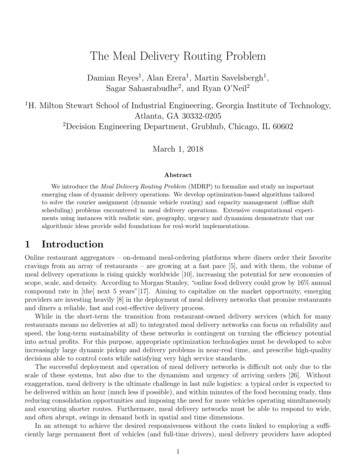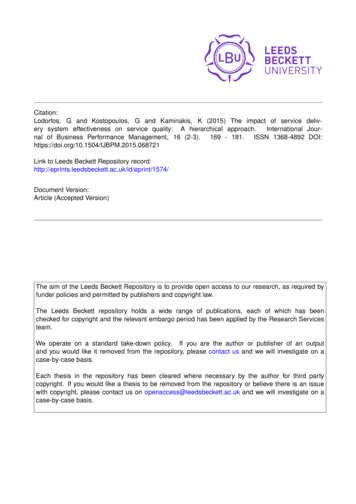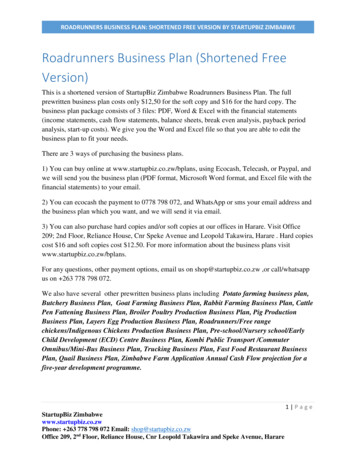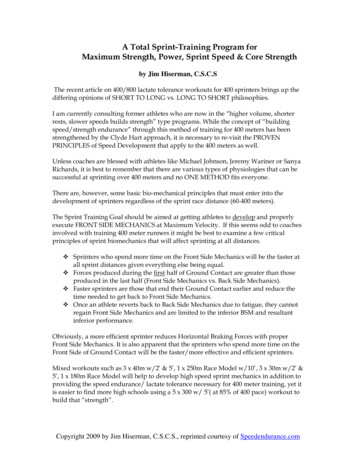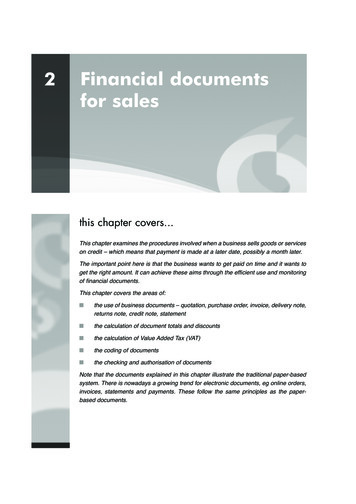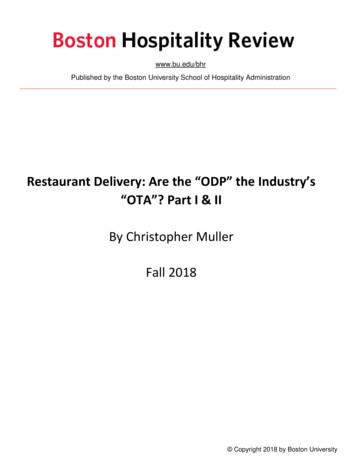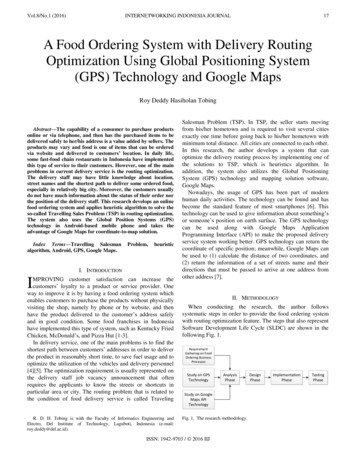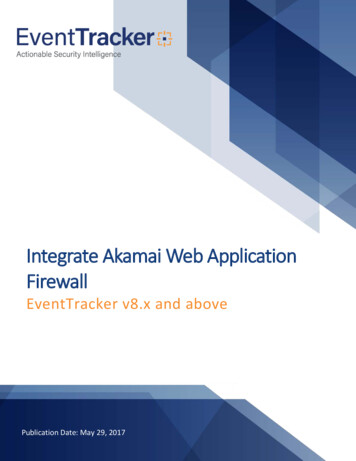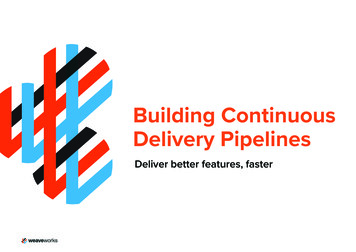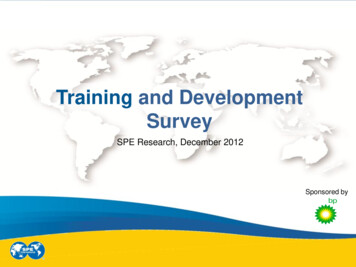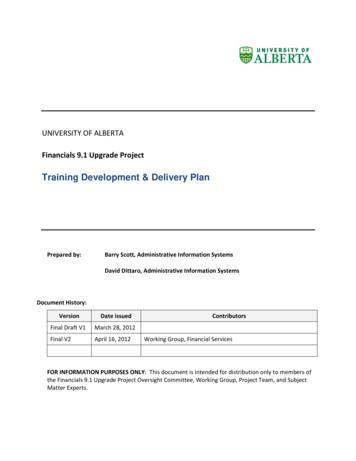
Transcription
UNIVERSITY OF ALBERTAFinancials 9.1 Upgrade ProjectTraining Development & Delivery PlanPrepared by:Barry Scott, Administrative Information SystemsDavid Dittaro, Administrative Information SystemsDocument History:VersionDate issuedFinal Draft V1March 28, 2012Final V2April 16, 2012ContributorsWorking Group, Financial ServicesFOR INFORMATION PURPOSES ONLY: This document is intended for distribution only to members ofthe Financials 9.1 Upgrade Project Oversight Committee, Working Group, Project Team, and SubjectMatter Experts.
Financials 9.1 Upgrade Project: Training Development & Delivery PlanThis document requires review and approval by the following individuals. The due date for acceptanceis April 17, 2012. Should an approver or reviewer not respond or be unable to respond by that date, thedeliverable will be considered accepted by that person.ReviewersSignatureSign DateSignatureSign DateJulie McClelland, Assistant Dean,Administration, Faculty of Science/Brian Boytang, University Chief Accountant andAssociate Director, Financial ServicesElly Ducharme, Senior Financial Accountant,Financial ServicesFrances Olinkin, Manager Production Services,Financial ServicesCeinwen Arndt, AIS Service Delivery Manager,Finance & ResearchSundip Mhamane, TCS Upgrade ProjectManagerBarry Scott, Project Steward, AISHarinath Katta, TCS Program ManagerMichael Walesiak, Associate Director, Financeand Information, Research Services OfficeChandra Wanigaratne, Manager/InfoManagement, Research Services OfficeApproversJody Brookwell, Business Lead / Director,Logistics & Business Services, SupplyManagement ServicesMichele Pearce Business Lead / Director,Financial Services - Financial Accounting andReportingLorraine Deydey, Business Lead / Director,Research Services Office2 Page
Financials 9.1 Upgrade Project: Training Development & Delivery PlanTable of ContentsBackground . 4Key Assumptions . 4Training Scope / Types of Training . 5Training Development Roles & Responsibilities . 6Training Development Steps – Existing Modules. 8Training Development Steps – New Development . 9New Development Training Topics . 9Training Audiences . 10Timeframe and Deliverables . 10Appendix A: Training Scope . 123 Page
Financials 9.1 Upgrade Project: Training Development & Delivery PlanBackgroundThe main objective of this project is to upgrade the PeopleSoft Financials application from version 8.9 to9.1 for the 10 existing modules, such as General Ledger, Accounts Payable and Travel & Expense. Inaddition to the “core upgrade”, there are two other major objectives. Electronic approvals will beimplemented for travel & expense claims, purchase requisitions, and delegation of signing authority.Also, the eProcurement module will be implemented for entry of electronic requisitions (eRequisitions);purchases currently initiated by a paper requisition will, in the future, be done directly in PeopleSoft.The upgrade project is considered the introductory point for electronic entry and approval of financialtransactions, and will be further expanded on post-upgrade (e.g., direct link to preferred suppliercatalogs).A training strategy for the project was released in October 2011. With the business scope now finalized,the purpose of this document is to confirm how training will be developed and delivered for go-live inAugust 2012.Key AssumptionsTiming1. The assumption at the time the strategy was developed is that the go-live date was May 19, 2012.The go-live date for the Financials 9.1 Upgrade project is now August 21, 2012. The dates in thisdocument have been adjusted accordingly.Training Content Development2. All training will be developed using Oracle’s User Productivity Kit (UPK). This is consistent with theapproach taken by the University since 2009 for PeopleSoft-related training.3. The on-line training can be presented in a classroom setting in an instructor-led mode, presentingeither using the UPK Player or by generating a learning guide in PowerPoint.4. Word-based learning guides can also be generated out of UPK.5. For existing modules, delta training can either be developed in UPK or as a Word-based learningguide. On the recent Faculty of Extension project, new functionality was developed in UPK and deltachanges were documented in Word and PowerPoint as a “What’s New for Campus Users” guide.Assume same for this project.6. Grants, Contracts, and Contracts have already been developed in UPK as part of the Grants 2.0project. As such, they will only require minimal updates.Training Delivery Methods7. For new functionality, training will be developed in UPK for on-line access in a self-learning mode.This is more convenient and effective for the learner as the training is available anytime, anyplace.8. Training will be accessible on-line using the AIS website (www.ais.ualberta.ca) under PeopleSoftTraining. The training is single sign-on (SSO) enabled and so anyone with a CCID has access.9. On-line training will be available in both Do-It and Try-It modes.10. UPK development will follow guidelines documented in the University of Alberta UPK DeploymentGuidebook, dated December 10, 2010.Training Standards4 Page
Financials 9.1 Upgrade Project: Training Development & Delivery Plan11. As required, the project team will work with Organizational Learning and Effectiveness (OLE), whoare responsible for the PeopleSoft User Training Program (PSUTP), to ensure that standards fortraining materials are met, and to determine how to transition these materials into the PSUTPprogram after the project.Roles & Responsibilities12. The Training Lead role will be responsible for delivery of this plan.13. The Financials 9.1 Upgrade project team will be primarily responsible for the development oftraining materials with the input and support of Subject Matter Experts from the central serviceunits: Financial Services, Supply Management Services, and Research Services Office.Management and Other14. In addition to system training, there will be emphasis placed on non-system factors which, if notaddressed, might impede the acceptance of new processes and procedures.15. Approval to proceed with training steps will be provided by the Training Lead &/or the responsibleBusiness Leads.Training Scope / Types of TrainingThis scope of this training plan, outlined in Appendix A, has been developed to address the needs ofcampus users.It is assumed that the central service units (Financial Services, Supply Management Services andResearch Services Office) will provide training and process support for their specialized roles, such asSMS buyers. Also, those units will be responsible, working with the Change Team to develop proceduresand forms, using roughly the same timelines as training development. See transition-based activitiesbelow for more elaboration.The types of training are listed below. Note that these are not mutually exclusive. Grants, Contracts andProject Costing will, for example, require both “delta” and existing UPK-based training development.A. Existing module “delta” training which addresses the changes users will experience betweenFinancials versions 8.9 and 9.1. Because it is temporary in nature, to introduce new features forexample, it is best developed as a learning guide in Word or PowerPoint.B. Existing PSUTP courses: any existing PeopleSoft courses which the PeopleSoft User TrainingPrograms (PSUTP) manages for Financials modules would need to be updated to, for example,replace screen shots with 9.1 versions. These courses include Financials Basics (FN01), Intro toFinancial Reports (FN02), External Billing (F02), AP JV Entry (W03/P02), Purchase Requisitioning(P03), and Travel & Expense (T01). These will need to be reviewed with Organizational Learning andEffectiveness who have the responsibility for these courses. Some, such as PO3 and T01, will need tobe replaced given those functions are undergoing significant changes. If replaced, this would ideallybe developed in Oracle User Productivity Kit (UPK).Other Financials Resources on the PSUTP site that will need review and potential updates: SpeedCode Inquiry – Learning Summary;5 Page
Financials 9.1 Upgrade Project: Training Development & Delivery Plan Setup your Financial Management Center (Financials Quick Links);Download eTRAC to Excel;PeopleSoft Icons, Buttons, and Hotkeys;Running a PeopleSoft Report;Save Search Criteria;Pop-up Blockers;Using Production and Reporting Simultaneously (obsolete); and,Other Research resources on the PSUTP site that will need review and potential updates.Other Research resources maintained by AIS that will need review and potential updates: Research Administration (UPK); Researcher Home Page (Researcher Self-Service) - web video/.pdf; eTRAC Inquiry and Reporting - Word document; and, Grants 2.0 Delta Guide (Researcher Self-Service) – Word document/C. Existing UPK-based training: the Grants, Contracts and Project Costing modules were developed inUPK 3.1. As part of training development, the UPK content will be updated to UPK 3.6, screen shotswill be updated to Financials version 9.1, and general clean-up will be done to have these modulesbe more consistent with other Financials modules in UPK.D. For new functionality such as eRequistions, Travel&Expense and Electronic Approvals, on-linetraining will be developed to provide detailed, step-by-step instructions on how to, for example,enter an eRequsition and complete an electronic approvals. This will be developed in Oracle UPK.Note: the approach (i.e., how topics are developed) for Electronic Approvals could be different thanhow topics are development for new functionality such as entering a T&E claim. The approvalprocess, for example, should be role-based similar to what was done for the Electronic Gradesprocess.E. For transition-based activities, while training may be involved, this will largely be achieved throughreadiness and business process-driven activities. This addresses preparation of central service unitsand service providers for the upgraded application in two areas: Business processes, procedures and forms which will change;Knowledge transfer and soft skills development which will help in the adoption of system andprocess changes as well as any organizational changes.Training Development Roles & ResponsibilitiesThe roles required for training development and delivery are outlined below. The 3 key roles are traininglead, content specialist, and subject matter expert. Given training will be on-line, there is no need forclassroom instructors.Training Lead Manage training and skills development program to ensure deliverables are met6 Page
Financials 9.1 Upgrade Project: Training Development & Delivery Plan Manage all aspects of training administrationGuide the training team through the stages of development and deliveryDevelop curriculum and lesson plans for a broad range of participantsParticipate in lead meetings and other stakeholder meetings as requiredOversee job role-mapping to course requirementsDevelop and deliver a knowledge transfer and sustainability planFulfilling this role will be the joint responsibility of Barry Scott and David Dittaro.Curriculum Designer and Developer (Content Specialist)The content specialist is typically a business analyst with PeopleSoft expertise who would be the primaryauthor of content developed in Oracle UPK. They are assisted by Subject Matter Experts from thebusiness units. Update content in accordance with content create/edit/review cycleUpdate content based on SME feedbackCompliance with the project-specific content creation plan and publishing cycle, and contentstandardsMust have been trained &/or have experience with Oracle UPKThe content specialists will be Tamin Pretty and Andrew Tecza, AIS Business Analysts. Andrew will beprimarily responsible for AR, Billing and GL modules. Tamin will be primarily responsible for Grants,Contracts, Project Costing, AP, Purchasing, Assets, and Travel&Expense modules. Responsibility foreProcurement will be determined.Central Service Unit Subject Matter Experts (SMEs) Providing input on content outline requirementsThe understanding of business processes for area of expertiseReviewing existing UPK contentContribute to scripts for new UPK contentCompliance to the UPK content creation planCommunicating with Content Specialists and UPK Administrator to ensure document status isupdated and currentThe subject matter experts who will work with the content specialists are as follows.ModulesSubject Matter ExpertsGrants, Contracts, Project CostingPurchasing, eProcurement, Travel & ExpenseGeneral LedgerAccounts PayableAssetsAR, BillingLorena Li, Chandra Wanigaratne, Michael WalesiakStefan Sicking, Wendy AbelBrian Boytang, Elly DucharmeNicole FluetDon Koebel, Brian BoytangCindy BizonOLE Learning SpecialistA learning specialist from Organizational Learning and Development may be assigned to work with thetraining development team to ensure alignment of project training with the PSUTP program andstandards.7 Page
Financials 9.1 Upgrade Project: Training Development & Delivery Plan Assists in the ongoing development, administration and delivery of training and educationalprograms in connection with management and promotional development, on the job training andemployee orientations.Develops and administers training courses and other non-technical training modules which mayinclude facilitation, coaching, communication, and leadership.Training Development Steps – Existing ModulesThe method for developing training will be slightly different for existing modules and new functionality.1. Delta training will address any significant items which are new for campus users. An example is newnavigation in version 9.1, see screen shot below which is typical of content found in a delta guide.Topics will be organized by module or by group of modules. Development of each delta topic willbegin with an outline developed by the content specialists and SMEs. It is important that the deltaor “what’s new” guide content be developed first, as it may be the source for types of training.Figure 1: New Navigation in Version 9.1 (Example)2. Once the topic outline is approved, the content specialist will develop the training materials with theassistance of SMEs.3. Once developed, the training content will be reviewed by SMEs and, if possible, a focus group ofcampus users.4. The training content will be published as a UPK topic, learning guide or otherwise.5. Review existing training materials to determine if a topic is covered by existing Financials training inthe PSUTP. Working with the Learning Specialist, assess the extent that existing materials must be8 Page
Financials 9.1 Upgrade Project: Training Development & Delivery Planupdated and then determine whether it is better to update the existing materials or replace/rebuildthe existing course in its entirety.Training Development Steps – New DevelopmentThe anticipated topics for new development are listed in the next section. All new development will bein UPK.1. Each topic should begin with an outline developed by the content specialist and SMEs. If the contentspecialist and SME are in agreement, then development can proceed without an outline.2. The content specialist will develop the training materials with the assistance of SMEs.3. Once developed, the training content will be reviewed by SMEs and, if possible, a group of campususers through UAT or a Focus Group.4. The training content will be published as a UPK topic.New Development Training TopicsThe following list of topics is provided for illustrative purposes only. The topics will be finalized throughthe outline and design steps which are scheduled for April to June timeframe.Training topics will be organized by functions (e.g., travel & expense) and training scenario (e.g., claimentry). Together, all the scenarios form the scope of training for new development. Each scenario willhave an outline developed.Each topic should stand on its own, covering a process end-to-end or addressing a unique function. Forexample, the unique steps to enter a travel claim in multi-currency will be a separate topic. It should notbe included in the main topic for TE1 (Claim Entry) as multi-currency will be used infrequently.Travel & ExpensesIDTE1Scenario NameClaim EntryTE2Claim ReviewTE3Claim ApprovalTE5TE6Financial Control and ReportingCentral SupportDescriptionPre-travel notification and claim entry by one of the following: Claimant Authorized Users – DelegateInternal control review of claims only: Internal Control ReviewTravel authorization and claim approval by: Account Holder - Financial Authority Account Holder Delegate Account Holder One-upReconciliation and reportingCentral administration and reportingeProcurementIDEP1Scenario NameRequisition EntryEP2Requisition ApprovalDescriptionOnline requisition entry RequesterRequisition approval including threshold limits approval by: Requester (Auto-approval of Operating Purchase Requisition)9 Page
Financials 9.1 Upgrade Project: Training Development & Delivery PlanEP4EP5EP6Purchase Order CreationFinancial Control and ReportingCentral Support Account Holder Account Holder Delegate Special Category Approver – RadioactivePO creation and change order processing (SMS Only))Reconciliation and reportingCentral administration and reportingFinancial DelegationTE4/EP3Delegation Assignment andManaging DelegationsAssigning and managing delegation of financial signing authorityTraining AudiencesThe following list training audiences is provided for illustrative purposes only. The audiences by usergroup or role will be finalized during Training Design.Campus Community User GroupsEmployeeResearcher (Project Holder)Research Project AdministratorDepartment Internal ControlReviewersHuman Resource ServicesDepartment ManagerDean, Director, ChairAssociate VPs/VPsVice Provost/ProvostSenior Financial OfficersGroup DescriptionThose who enter or have entered on their behalf travel & expense claims&/or purchase requisitions.Those who enter or have entered on their behalf travel & expense claims&/or purchase requisitions related to research.Those who may enter claims and requisitions on behalf of researchers.For internal control review purposes onlyApproves Professional Expense Reimbursements (PER) which will be enteredby employees (where applicable) as an expense claim.May be a claimant, requester or account holderMay be a claimant, requester or account holderMay be a claimant, requester or account holderMay be a claimant, requester or account holderThose who are responsible for reconciliation and operational reportingwithin a faculty/departmentThe following audience can take advantage of the training content develop for the campus community,and can develop their own training as required.Core Project User GroupsCentral Service UnitsApplication Management SupportGroup DescriptionUnits responsible for central administration within the University: SupplyManagement Services, Research Services Office, Financial Services, andFacilities & OperationsTCS personnel and AICT HelpdeskTimeframe and DeliverablesThere are four major steps in the development and delivery of training. The timeframes indicated beloware for the core upgrade. Some scope related to electronic approvals will be delivered later and itstraining development will need to be accelerated to ensure the end date of Aug. 21st is achieved.10 P a g e
Financials 9.1 Upgrade Project: Training Development & Delivery Plan1. Topic Outlines: confirms all of the content to be developed. Depending on the nature of the topic,may require a formal review process, or, if simply requiring updates to the screen shots for example,may be informal. One document will address all types of training.2. Training Design: detailed design of the content to be developed or updated for each topic.Depending on the nature of the topic, design may not be required. The delta guide will require itsown design.3. Training Content Development: several review cycles required before final version is ready forposting.4. Posting Training Materials: making the materials available to users and communicating to userswhat training is available for them (based on their role) and how to access it.Phase / MilestoneDescription / CommentsTraining Plan ApprovedTraining OutlinesDevelopedTraining Lead OnboardTraining OutlinesReviewed & ApprovedTraining Design (*)Training Development (*)PrimaryResponsibilityStartDateEndDateBarry ScottFor all scenarios in newdevelopment and delta topicsDave Dittaro,Content SpecialistsBarry ScottApr. 5Mar. 26May 10Training LeadWill be done in conjunction withUATWill be done later in UAT cycleApr. 30May 18Content SpecialistsMay 22Jun 21Content SpecialistsJun 22Aug. 3Test On-line Training:Beta VersionLater in the UAT cycle, provideTraining LeadAug. 3Aug. 18on-line training for user testingto confirm its correctness andusability.On-line Training FinalFor posting to the trainingTraining LeadAug. 18Versionwebsite.Post training on-lineCommunicate to users whatTraining LeadAug. 21training is available and how toaccess it.(*) Some development related to Electronic Approvals will not be completed until June and so UAT andtraining development will be done on later dates.11 P a g e
Financials 9.1 Upgrade Project: Training Development & Delivery PlanAppendix A: Training Scope1. Research Administration (Priority 1) Overviewo Process Flowo Related Policies and ProceduresGrants Management Toolso Using RSO Home Pageo Using Task ManagementProposal Development – Create to Submito Prepare and Submit Proposals Create Proposal Update Proposal Submit Proposalo Supplemental Information Using My Proposals Search for a Proposal View Customer (Sponsor) View Customer (Sponsor) Program Details Add Non-U of A EmployeeProposal Development – Update to Award Generationo Proposal Update to Award Generation Update Proposal V2 Generate Awardo Supplemental Information Validate Indirect Cost Add Sub-recipientAward Management – Setup to Activationo Overviewo Review and Update Awardo Review and Update Project and Contract Assign Project Manager Assign Project Chatfield Attribute Review and Update Contract Headero Complete Project and Contract Setup Assign Rate Sets to Project Activities Create Funds Distribution Review Accounting Distribution Review and Assign Revenue Plans Review and Assign Billing Planso Complete Activation Process Activate Award, Contract and Project12 P a g e
Financials 9.1 Upgrade Project: Training Development & Delivery Plan Finalize Project BudgetCreate SpeedCode2. External Billing (Priority 2) Overviewo Process Flowo Related Policies, Procedures and FormsBill EntryPrinting InvoicesCorrecting ErrorsMaintain Bill StatusMonitor Invoiceso Inquiryo Queries3. AP Journal Voucher Entry (Priority 2) Overviewo Process Flowo Related Policies, Procedures and FormsCorrecting AP Voucher Line Distributiono Review Voucherso Entering an AP Journal Vouchero Verify AP Journal Vouchers Inquiry Queries4. Electronic Tracking and Research and Awards Online (eTRAC) (Priority 3) OverviewSecurity AccessSearching for ProjectsInquiryReporting5. Researcher Home Page (Priority 3) OverviewSecurity AccessSearching for Proposals or ProjectsViewing ProposalsViewing ProjectsProcurement and Electronic Approvals Scope1. Purchase Requisitioning (Priority 1)13 P a g e
Financials 9.1 Upgrade Project: Training Development & Delivery Plan OverviewProcess FlowRoles and ResponsibilitiesRelated Policies and ProceduresCreate Requisition (Requester)o Define Requisitiono Add Item or Serviceo Review and Submit Insert Comment and Attachment (e.g., Vendor Quote) View Accounting Lines View Print View Routing Submit RequisitionApprove Requisition (Approvers)o Via Email Notificationo Via Manage RequisitionsMonitor Requisitionso View Requisition Cycle in Manage Requisitionso View POo View Vouchero View Payment2. Travel & Expenses (Priority 1) Overviewo Process Flowo Related Policies, Procedures and Formso Roles and ResponsibilitiesClaimant Entry (Claimants and Authorized Data Entry Users)o Create Travel Notification Expense Report Travel Reimbursement Expense Reimbursement Professional Expense Reimbursement Travel Advanceo Maintain Travel Notification Expense Report Travel Advanceo Inquire Travel Notification14 P a g e
Financials 9.1 Upgrade Project: Training Development & Delivery Plan Expense Report Paymento Year End Considerationso Assign Authorized Data Entry UsersInternal Control Review (Research Only)o Review Expense Reports Expense Reimbursement Travel Reimbursement Travel Advanceso Reconcile Travel Advanceso Update Employee Profileso Correct or Transfer Posted Expense Reportso Year End Considerationso Verify Expense Reports and Travel Advances Inquiry QueriesApproval Expense Transactions (Approvers)o Approve Travel Notifications Expense Reports Travel Reimbursement Expense Reimbursement Travel Advanceso Reconcile Travel Advanceso Update Employee Profileso Correct or Transfer Posted Expense Reportso Year End Considerationso Verify Expense Reports, Travel Advances and Travel Notifications Inquiry Queries3. Manage Delegations (TBD) Add Delegates (Budget Owner) Update Delegates (Budget Owner) Accept/Reject Delegation (Delegate) View Delegations (Budget Owners and Delegates)15 P a g e
either using the UPK Player or by generating a learning guide in PowerPoint. 4. Word-based learning guides can also be generated out of UPK. 5. For existing modules, delta training can either be developed in UPK or as a Word-based learning guide. On the recent Faculty of Extension

